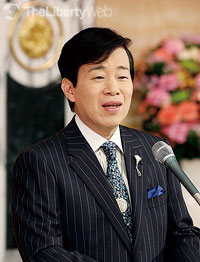The Person’s Caliber Does The Work
Lecture on "The Power of Character" 16 June 2018 at Happy Science Special Lecture Hall
Lecture on “The Power of Character”
16 June 2018 at Happy Science Special Lecture Hall
Master Okawa’s “The Power of Character” is a popular book among business leaders. So, Master Okawa recently gave a follow-up lecture on the book. The Liberty Web will be presenting a transcript of this lecture over 5 issues.

Master Ryuho Okawa
Master Ryuho Okawa was born on July 7th, 1956 in Tokushima Prefecture, Japan. After graduating from The University of Tokyo, a prestigious university, he joined an international trading company based in Tokyo. While he worked at the company’s New York headquarter, he studied international finance at the Graduate Center of the City University of New York.
In 1981, he attained Great Enlightenment and awakened to the hidden part of his consciousness, El Cantare, whose mission is to bring true happiness to all humanity. [Read more]
Master Ryuho Okawa:
I would like to present an analysis of my book “The Power of Character,” which is a compilation of my Q&A sessions serialized in The Liberty Magazine.
I think it covers very important material. It is my hope that in talking about this book I inspire my listeners and readers to pick up a copy some time. There are so many [of my] books being published that I’m sure many of you don’t know which ones to read, but listening to my lecture you may start to feel a real need to read this one.
This book is essentially about virtuous leadership in the modern age, and about how a “person’s caliber” performs. Many of you may think that being proficient at work comes down to abilities, knowledge and skills. If you do, it means that you are still thinking in a worldly way.
In the end, it is a person’s character that does the work. It is something that is hard to describe, but it does exist.
This may not be the best thing to do, but let’s look at it through the Japanese TV drama about Takamori Saigo [one of the leaders of the Meiji Restoration]. Watching the protagonist, he doesn’t look like Saigo. The actor’s put on weight to look like Saigo, but it still doesn’t look like Saigo. The difference is in that person’s constitution, and it’s something that acting cannot achieve. The actor can memorize the script and carry himself in a distinctive way, but it is about something that seeps out of the person’s inner realm. Without it, the actor will never really appear to be Saigo.
In other words, what is important is what’s on the inside. It is possible to make people brilliant, but it is no easy task to build a character of weight and quality.
For instance, if we look at the behavioral patterns of animals and other things in the natural world, we can see that those with power and intelligence always act to their advantage. Those with less power and intelligence lose against the laws of nature. Nature always divides herself into those who eat and those who are eaten.
But in our world, there are always a certain percentage of people who act against the laws of nature despite their many abilities, experiences, talents, financial power and status. It is a mysterious thing.
For some reason these people behave to what seems to be their disadvantage. This is not about self-harm and suicide: it is a realization that reducing their ego will bring more to other people and leave behind something greater.
It is hard to describe, but the thing I’m trying to say today all comes down to this idea.
Our Education Doesn’t Teach Virtue
Japan’s school education teaches us intellectual education; it tests our memory; it trains our brains to be precautious and suspicious through trick questions. It produces great numbers of bright people every year.
But looking at this huge number of bright people, I can’t help but feel that there is something missing from them.
Their motivation to polish their knowledge and skills to stand out from others seems to come from the desire to find ‘prey’ fast; and being strong against trick questions is just a technique to gain high marks.
They are people who suspect everyone they meet, and spend their whole lives trying to avoid traps; people who engage in dirty practices in order to maintain an image; people who look for a path to success through connections and back alleys. These people may look clever, but we cannot deny that they are crafty.
There are many people who look for shortcuts to success for their own benefit, and it is their education that teaches them to be like this. I can’t help but think how difficult it is to break free from this education and become a person who aims to accomplish virtue.
Teachers can’t teach you this. No one in our current education system can teach morals and virtues. The old education system [that ended in around 1950] did have such people. For instance, Inazo Nitobe was the principal of the First Higher School, and taught morals. We don’t have many people who can teach these things any more.
Nowadays most people think that they can make results fast if they find a good ‘how to’ method. They think that it’s important to be first in best dressed or they lose their spot: take your slice of pizza before someone else does. You win if you eat more slices, and it means you’re clever. I’m disappointed that the Japanese people have become like this too.
Where Being Animalistic Will Take You
There was nothing of the sort before the major recession of the 1990s. When I was on holiday in Thailand, we went on a travel plan where a boat took us to an island where we could swim for a bit and come back. During this course, they served us lunch. It was a buffet.
I watched with my arms folded as a flood of Chinese tourists came in and started eating the food. I was seeing if I should wait until everyone finished and left. Then our Thai guide came over and said, “Japanese people all do the same thing. When everyone’s eating, they stay away.”
People in Japan must have been living fairly comfortably back then. The guide told us that Chinese people take as much as they can because they think it is a waste if they don’t. It’s a buffet after all. But the Japanese people don’t do that.
He warned us that the food will be gone soon, and when I replied that I don’t mind it I don’t get any, he looked at me strangely. He couldn’t believe that someone paying money for the course was okay if they got nothing to eat.
Humans are patterned to behave so they try to gain more for themselves. This is an extension of an animalistic nature. In Japan we say that only when basic needs are met can people learn manners: it takes time for people to start thinking about manners.
For example, in North Korea being fat means you have power and wealth, but in Japan it means no such thing. Half a generation ago a man with a potbelly was known to have “a president’s physique,” but nowadays we would say that he is failing to control his weight. The current expectation is to practice moderation.
Already back when I was working in New York, my colleagues told me that I had no right to become an executive or president because I couldn’t keep my weight under control.
But no one said anything of the sort in Japan. They had this thing called “a president’s physique,” and the average waistline of a Japanese company president at the time was 92 cm, whereas in the U.S. it was a reason for people to think the person didn’t have enough willpower to make it as a president.
They think that we must control our diet and exercise regularly, and it seems that Japan has finally caught on. They’ve set criteria for metabolic syndrome and are now researching ways to control it.
It is hard to bring your mind to these things while basic needs are not met, but it will eventually shift in this direction.
I think what I’m saying is quite clear. The power of character is not measurable in one’s weight or waistline, but it follows stages of human development.



















